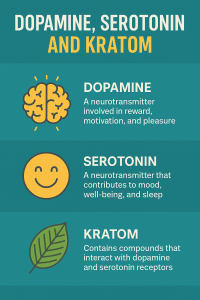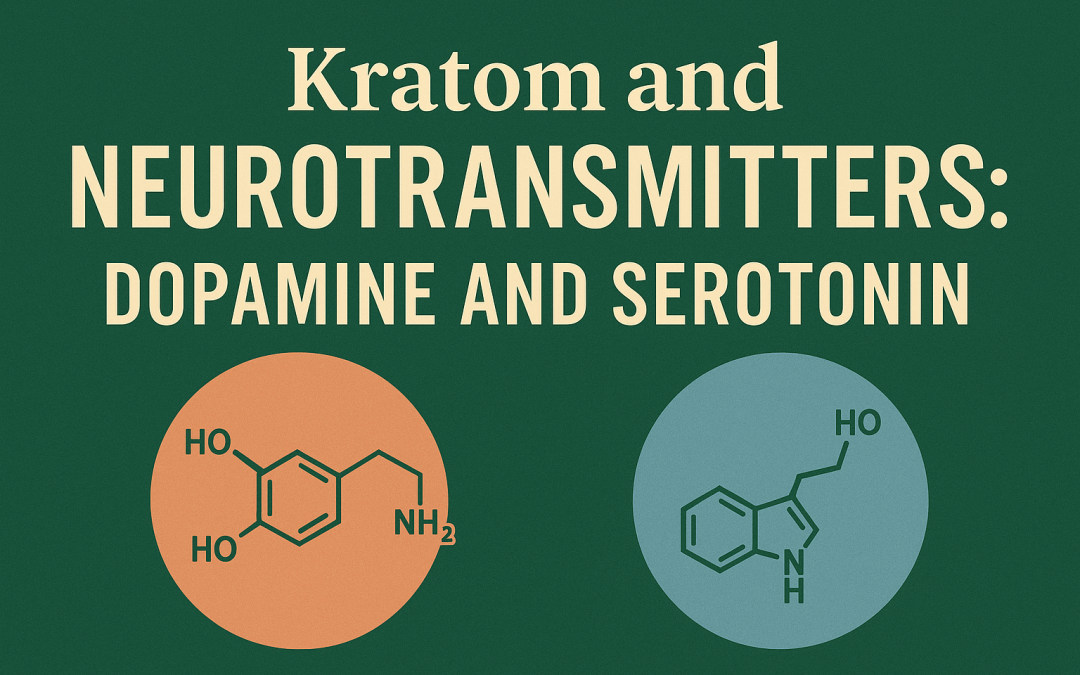Can Kratom Influence Your Brain’s “Feel-Good” Chemicals? The Role of Dopamine and Serotonin
For those who use kratom for mood, energy, or emotional balance, there’s a growing curiosity: Can kratom affect dopamine or serotonin levels? These neurotransmitters are central to how we feel—our motivation, sense of pleasure, and emotional resilience.
While kratom is not a pharmaceutical antidepressant, its active compounds do interact with some of the same receptors targeted by mood-enhancing drugs. Understanding how kratom may affect these “feel-good” chemicals can help users make more informed decisions and identify which strains or doses are best suited to their needs.
🗝️ Key Points
-
Kratom’s alkaloids may influence dopamine and serotonin pathways, particularly at low to moderate doses.
-
Mitragynine and 7-hydroxymitragynine interact with receptors that regulate mood, reward, and motivation.
-
Some users report elevated mood, motivation, or relief from depressive symptoms—but results vary.
-
Scientific research is limited, but early findings suggest kratom may modulate dopamine-related systems.
-
Responsible, informed use is key to avoiding dependence and maximizing benefits.
🧠 What Are Dopamine and Serotonin?
 Before diving into kratom’s potential effects, it’s helpful to understand the basics of these two neurotransmitters:
Before diving into kratom’s potential effects, it’s helpful to understand the basics of these two neurotransmitters:
🧬 Dopamine
Often called the “reward chemical,” dopamine plays a major role in:
-
Motivation and drive
-
Pleasure and satisfaction
-
Goal-directed behavior
-
Addiction and habit formation
Low dopamine levels are associated with fatigue, lack of motivation, and low mood.
🌈 Serotonin
Known as the “feel-good hormone,” serotonin helps regulate:
-
Mood and emotional balance
-
Appetite and digestion
-
Sleep cycles
-
Memory and cognition
Low serotonin levels are linked to anxiety, depression, and mood instability.
🌿 How Kratom Works: A Quick Overview
Kratom (Mitragyna speciosa) is a Southeast Asian tree whose leaves contain over 40 active alkaloids. The most well-known are:
-
Mitragynine
-
7-hydroxymitragynine
These compounds interact with:
-
Mu-opioid receptors (influencing pain and mood)
-
Adrenergic receptors (impacting energy and alertness)
-
Serotonin and dopamine pathways (potentially affecting mood and reward)
📖 A 2024 review in Frontiers in Psychiatry noted that kratom has complex pharmacology, including activity at adrenergic, serotonergic, and dopaminergic receptors.
🧪 Kratom and Dopamine: What the Research Says
🟡 Animal Studies
-
In one 2014 study, mitragynine increased dopamine levels in rat brains, particularly in reward-related areas like the nucleus accumbens.
-
This effect was dose-dependent—low doses stimulated dopamine release, while high doses produced sedative effects.
🧠 How It May Work in Humans
While human data is limited, kratom’s dopamine-stimulating potential could help explain why some users feel:
-
More motivated
-
Uplifted or euphoric
-
Better able to focus or perform creative tasks
However, this same reward pathway is linked to habit formation, which is why kratom must be used responsibly.
🌤️ Kratom and Serotonin: Mood and Emotional Regulation
🧬 Potential Mechanisms
Kratom’s alkaloids may indirectly influence serotonin, though this effect is not as clearly defined as with dopamine. One theory is that kratom may:
-
Inhibit serotonin reuptake (similar to how SSRIs work)
-
Interact with 5-HT2A receptors, which are involved in mood and perception
📖 A 2020 study reported mood enhancement and reduced depressive symptoms among kratom users, suggesting serotonergic involvement.
🧘♂️ What Users Report
-
Improved mood stability
-
Decreased anxiety
-
Enhanced emotional resilience
-
Feelings of calm focus or light euphoria
💬 Real User Testimonials
“Green Maeng Da has helped me feel more optimistic and motivated in the mornings. I used to wake up sluggish and down—now I feel like I can get things done.”
— Jillian M., 34, Graphic Designer
“I’ve struggled with mild anxiety for years. Low doses of White Thai help me feel alert but grounded. I’m more patient with my kids and clearer in my thinking.”
— Derek T., 41, Father of 3
“After switching from coffee to kratom tea, my mood is more stable. I don’t get the highs and crashes anymore.”
— Alyssa N., 29, Wellness Coach
🎯 Which Kratom Strains Are Most Associated with Mood and Motivation?
✅ White Vein Strains
-
Uplifting, energizing, often associated with dopamine-like focus and drive
-
Best for mornings or productivity
-
Popular: Maeng Da, White Thai
✅ Green Vein Strains
-
Balanced and smooth; supports mood, mild energy, and emotional clarity
-
Often used for social anxiety or creative work
-
Popular: Green Malay, Green Maeng Da
⚠️ Red Vein Strains
-
Typically more sedative and calming
-
May help ease tension or irritability but less helpful for dopamine-driven tasks
📋 Responsible Use and Brain Health
Kratom may support neurotransmitter balance in some people, but long-term, heavy use could have the opposite effect.
💡 Tips for Smart Use:
-
Use in moderation (2–3 days/week)
-
Rotate strains to avoid dependence
-
Keep doses low to moderate (1.5–4g for mood)
-
Hydrate and eat well—dopamine and serotonin are sensitive to nutrition
-
Consider cycle breaks (e.g., one week off every 4–6 weeks)
❓ FAQ: Kratom and Neurotransmitters
Does kratom increase dopamine?
Animal studies suggest kratom can boost dopamine levels in the brain, especially at lower doses. Human research is still developing.
Is kratom similar to an antidepressant?
While it may produce mood-enhancing effects, kratom is not classified as an antidepressant and should not replace prescribed treatments without medical guidance.
Can kratom improve motivation?
Many users report increased motivation, clarity, and emotional uplift—often attributed to its interaction with dopamine systems.
Does kratom affect serotonin levels?
Kratom may influence serotonin receptors indirectly, particularly at moderate doses. More research is needed to fully understand this.
Can you use kratom daily for mood?
Occasional use is generally safer. Daily use may lead to tolerance or dependence and should be monitored closely.
✅ Final Thoughts
Kratom’s influence on dopamine and serotonin systems may help explain why it’s so commonly used for mood, focus, and motivation. While the science is still emerging, both research and user experiences suggest that kratom may play a role in how we feel, think, and engage with the world.
As always, responsible use is key—and the more you understand your body and brain, the better you can use tools like kratom to support your well-being.


